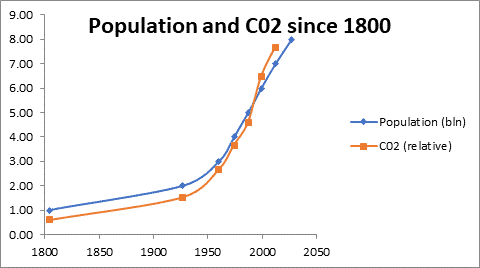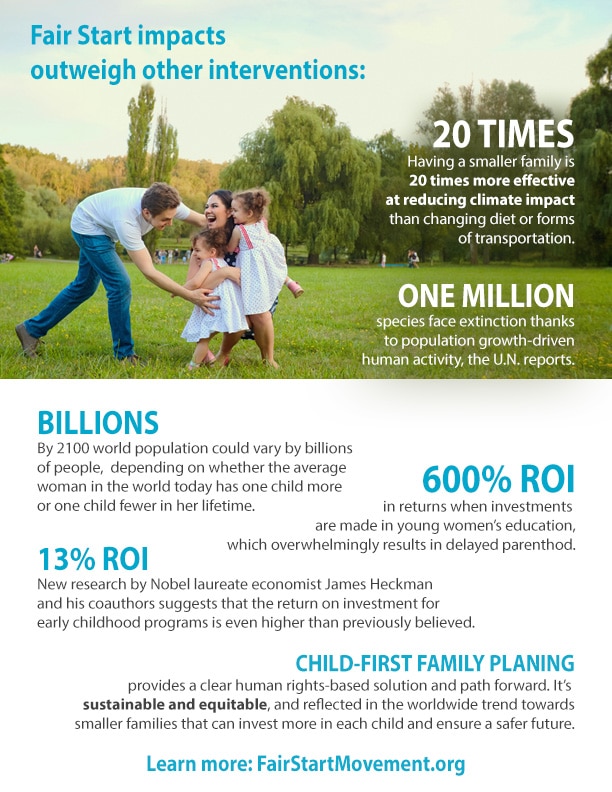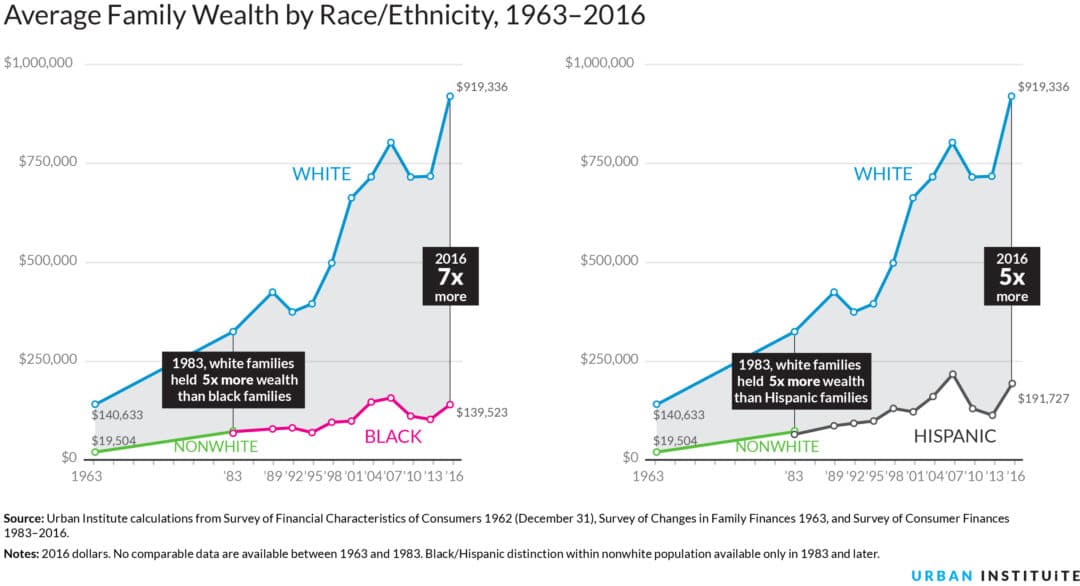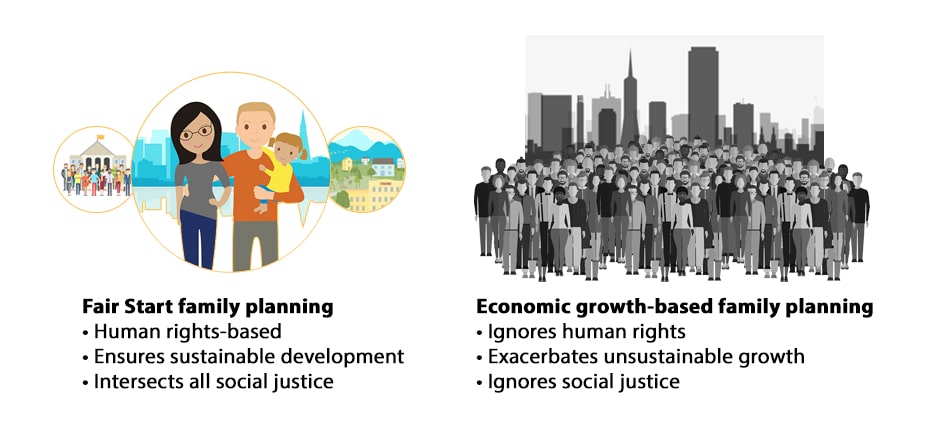When faced with a problem they helped cause some people will simply try to distract by saying something that makes no sense.
Based on his recent article pushing women to have more kids as soon as possible to ensure economic growth, it seems that Bryan Walsh, an editor at Vox, is one of those people. In his prior positions at Time – over a span of many years – he had opportunities to push for impactful changes in policy, like Fair Start family reforms that simply peg family planning policy to standards like the Children’s Rights Convention, that would have not only mitigated the climate crisis but saved children from dying in the ecosystems it has and will continue to destroy.

He did not do that, but embraced the anthropocentric policies that created the crisis, and at a time where real change could have been made.
Bryan is relatively wealthy, white and influential – having risen to his position on a pyramid of inequitable growth that imposed costs on communities of color born with a fraction of his wealth, communities that will absorb the harms he would help cause by exacerbating the climate crisis.
Faced with these facts Bryan’s reaction is to double-down, and simply push women to have more kids to further build the unsustainable pyramid schemes that prop up Bryan, Elon Musk and others like them. He makes four obvious mistakes in his opinion piece (framed as an article) which show the fundamental cause of the crises we face today.
- Walsh is writing with a conflict of interest, but never discloses it: Vox is supported by businesses that thrive on what one Nobel Laureate called a Ponzi Scheme of population growth. His writing supports that scheme relied on by his advertisers, at cost to nature, equality, democracy, and child welfare. He should discuss that.

- He conflates economies with democracies: Per Bryan, “Declining population growth really does pose existential challenges to America, and without more children, the country really does face a future that is less innovative, less wealthy, and less vibrant.” The ideal of the United States is democracy, but inequity, growth and ecocide has degraded that ideal, and traded it for the gross domestic product (probably preference-based utility) that is the base value from which Walsh operates. He’s talking about an America of crowded shopping malls, not town halls in biodiverse nature where people are actually free. That freedom is a value we can test and measure with a simple inversion test. That inversion test – which Bryan’s proposal fails – has survived five positive peer-reviews. Bryan, conversely, has no expertise in population ethics, and his opinions conflict with leaders in this space.

- Bryan undercuts all of the values he purports to promote: Per Bryan, “[t]he progressive agenda should be about empowering people to live the lives they desire, to pursue their own path to happiness, and children can and should be part of that. Conservatives are right that a baby bust without end threatens America’s future…” Nowhere does he promote minimum levels of welfare for children, equal opportunities in life for children, restoration of nature and climate restoration, or democracy where citizens actually have influence on systems of governance. These are the basic values that comprise a good life. The United States, like most nations, has used family planning policies throughout the past several decades that treated the act of having children as a matter of parental autonomy, rather than ecosocial child equity (children have the most at stake when it comes to having kids), rather than acting in compliance with the values that underlie the Children’s Rights Convention – which is the standard by which we judge whether we are actually creating democracy. Byran’s writing reflects these mistakes.
- Bryan presumes we can eventually limit emissions, while ignoring the risk and harm he’s imposing on others: Current emissions from big polluters like the United States are already harming children, and Bryan proposes nothing that would compensate them, or protect them through family planning reforms like a robust “baby bond” program. Instead he’s using hope as a strategy. And how did that work out for climate policy so far? Not so well.
- This is a simple fact. If you wanted to do the most good possible, you would shift the extreme wealth from the top of the economic pyramid – in the form of sustainable family planning entitlements – to young women as a means of liberating them financially, and allowing them to ensure their children the first and overriding human right: A ecosocially fair start in life with a restored climate and equal opportunities in life. This is where effective altruism, which Bryan espouses, goes wrong: You cannot be altruistic with wealth you do not fully own because you would not have paid the costs its creation imposed on others. You have to start with justice instead.

People like Bryan Walsh can be useful in this regard, and targeting him and other powerful people publicly to show truth can save millions of lives.
Bryan is using his position to impose costs on others, relative to a democratic baseline. We can make examples of people like Bryan, ensuring they account for their role in the crises we face today, and taking from them the relative wealth and power future generations deserve as we physically constitute true democracies though climate restoration funded by birth equity redistributions of wealth. Bryan only has to address the points above in his work, or to agree to publicly debate them, in order to actually free people. He just have to tell the truth. And while the average citizen does not have the power of a Vox editor, they have the capacity to be activists, and approach Bryan and confront him simply as a citizen who is harming others.
TAKE ACTION: In his article Bryan accepts that “very real suffering that will be unavoidable thanks to warming, especially in poorer countries.”: He is willing to accept the suffering of others – especially children in the global south, while protecting his own children from that suffering, and rather than taking simple steps to prevent it.
Think about that as you engage Bryan in person or online – https://www.linkedin.com/in/bryan-walsh-9881b0/, in a peaceful and lawful way, to admit his mistakes, and to pay for the benefits he and his family received in a system that was imposing costs – ecologically and socially – on others. Use him as a fulcrum to bend the arc of our species away from exploiting children for economic growth, and towards justice.

